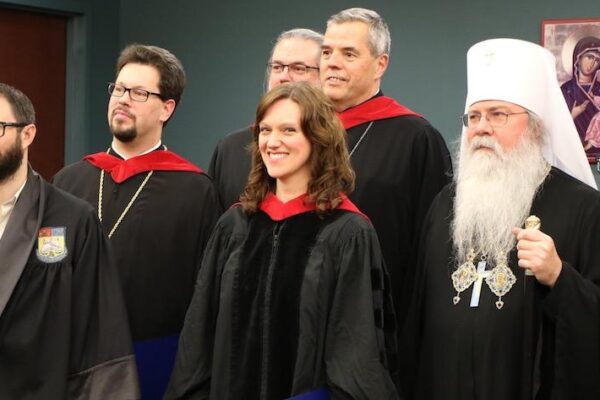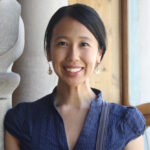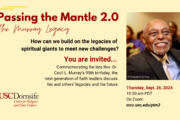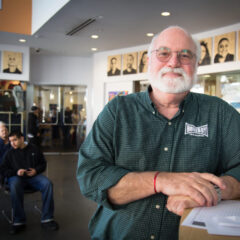This radio documentary was produced by KALW’s The Spiritual Edge, with the support of CRCC’s global project on engaged spirituality.
To hear this and other profiles, subscribe to The Spiritual Edge podcast in your favorite podcasting app, including Apple podcasts, Spotify or Google Podcasts. Find out more on The Spiritual Edge website.
Sarah Byrne-Martelli remembers being fitted for her medical grade N95 mask on her first day back at work during the pandemic.
“They have a kind of metal piece over your nose and you’re supposed to push it through to the back of your skull for 10 seconds, really hard,” she says. The mask suctioned to her face like a vacuum. Then came the face mask and a sugar spray, and they held up a poem for her to read aloud, to determine whether the mask fit tight enough.
It was the spring of 2020 during the first wave of the COVID-19 pandemic in Boston. The city was under lockdown for the first time, as the death count was rising. Ambulance sirens had become a civic soundtrack, while people stressed about where and how to get their groceries, and they applauded frontline workers from their balconies at eight o’clock every night.

Sarah Byrne-Martelli is one of these frontline workers at Massachusetts General Hospital in Boston, which is a world renowned teaching hospital affiliated with Harvard Medical School in Boston. However, she’s not a physician or a medical worker. Rather, she’s a chaplain in the palliative care department — the person who sits with you and prays with you and your family, during a patient’s last days of life.
Instead of heavy robes or stiff collars though, Sarah typically favors skirts and dresses and black patent leather clogs, which are the kind you see doctors and nurses wear because they’re on their feet all day, and her hair is in what she self-proclaims a permanent messy ponytail. She doesn’t bother to correct most of her patients who assume she’s Catholic. In reality she’s a trailblazer in the Russian Orthodox Church, as the first woman in her denomination ever.
She laughs as she recalls: “Like I had these ridiculous pictures of me with like all very, very bearded, Orthodox priests. It’s like one of these things is not like the other.” Sarah admits this wasn’t an easy road, and in the 18 years that have followed, she has mentored other women who have followed in her footsteps.
Before the pandemic, work at the hospital was frenetic
A typical day at the hospital before the pandemic for Sarah was frenetic. A flurry of doctors and nurses would be trying to determine the best clinical route for a patient who is dying. Meanwhile a patient’s family might be waiting for a divine intervention of sorts, believing that the doctors have given up too soon. Still another family might wonder if their decision to take a loved one off a respirator, which would lead to their death, equates to trying to play God? These are the scenarios when Sarah, the chaplain, is called in to counsel families. She is the first to admit that she does believe in miracles but “sometimes miracles don’t happen in the timeframe or in the way that we want.”
Another one of Sarah’s most significant roles before the pandemic was that of family mediator. She points out that conflicts in families are often an expression of grief, and through her warmth and humor she convinces families who have been fighting to start talking again.
Sarah is steadfast, warm and even the medical teams in the ICU say she’s surprisingly funny. She once joked about how to approach a patient’s family: “ I’ll just start praying so they can’t start arguing with each other.”
She is the kind of person who can get you to open up, like someone you’ve known for a long time, even though you’ve just met. She’ll help people tell stories, sometimes she’ll even give them hugs, and she’ll whisper in a patient’s ear as their breathing starts to slow.
Sarah Byrnes Martelli is a human touch in a sea of machines and procedures that sustains someone at the end of their life.
How do you help someone who is grieving when they’re on a ventilator and can’t speak?
Once the pandemic hit, the hospital placed iPads by patients’ bedsides and sent Sarah to work from home. She cared for patients by phone, but she was limited in what she could do from a distance. Several weeks passed before she returned to the hospital to see patients again in person.
By then the hospital had become a battleground with focused intensity. Massachussetts General closed its coffee shops, restricted visitors, COVID patients had taken over the wards and many were dying alone.
The first COVID patient Sarah cared for in person was a man in his 70s. He needed the help of a ventilator to breathe and wore protective mitts on his hands, which indicated that at some point he had deliriously tried to pull his own tubes out — a common occurrence in the intensive care unit. Sarah introduced herself and the patient turned his head to look at her. He would nod a little bit, and he would cough a lot.
“You know, being a human myself and being new to the COVID experience,” Sarah admits, “It was a little scary every time he would cough, because then I would wonder, am I too close to him?”
Her glasses started to fog up and she paused as she approached his bedside. Did this mean that her mask wasn’t working?
She continued: “I don’t know but now it’s too late because I’m in here, so I’m going to just try to do my best. He couldn’t speak and the question is how do you help someone who’s grieving grieve when they can’t speak?”
She wasn’t sure if the patient understood who she was. He had been admitted to the hospital together with his wife. They were both COVID positive and she had just died, but he couldn’t see her, since he was on a respirator and isolated. Doctors and nurses didn’t know what else they could do for him, so they sent Sarah in. She knew the man was a Christian, so she found some Psalms to read for him, hoping that this might be something he did in the past and that he would find it comforting and familiar.
As she prayed with him Sarah admits she felt helpless.
“I felt like I didn’t know if what I did made a difference. I will never know. And it’s important to be okay with that,” she shares. “You know, in moments like that, the most important thing you can do is just be quiet. Be reverent, respectful, not fill in the space with just like chatter.”
I ask Sarah if she ever feels scared of death, having seen so much of it.
“No,” she says. “I mean, what scares me is people who are in really bad pain or people who are alone. People who don’t have support. That definitely scares me.”
During the pandemic, Sarah says that too many people have been dying alone, with families grieving over Zoom and friends offering condolences on Facebook. She wonders about the impact this will have on those who have been grieving. Meanwhile Sarah is there in person, to ensure that her patients aren’t dying alone.
Supporting other health providers
In those early months, Sarah found herself praying, not just for the patients, but for the doctors, the nurses and others on her team. They turned to her during quiet conversations in the hallway and at their morning huddle, she led them in meditations. Even for professionals who often saw death, the pandemic was just too much. They were exhausted and feared getting the virus themselves, and some did.
Sarah remembers a doctor at the hospital who had become a patient herself. She was in a prone position, lying face down, and on a ventilator for weeks, after having contracted the virus while caring for a patient.
I asked if there was a doctor I could interview for the story, but none would talk on record. At a recent staff training, a facilitator asked the doctors to share about what had happened in the early days of COVID care. Telling their stories re-traumatized them; they’d survived and they’d rather put it behind them.
Transitioning to home life after intense days at the hospital
Sarah tries not to cry at work in front of her patients, but after she leaves the hospital, things are different. After finishing her shift on her first day back at work during the pandemic, she drove home in a downpour of rain. Unintentionally, she slowly ran a red light, and a police officer pulled her over. She rolled down her window, the rain started beating down into the car, and she started sobbing.
“Are you okay? Do you know what you just did?” he asks.
“I work at Mass General and I’ve had a really hard day, you know.”
She sobbed.
The police officer excused her with a warning.
“But it was one of those where it really hit me,” Sarah says.
When she arrived at home, her husband and her six year old son were waiting for her. They brought her some tea and a glass of wine with a blanket, and they let her cry. This was important, too, she says.
She admits her fear of bringing the virus home to her family, but that doesn’t keep her from talking about her work with her six year old son.
“I think he has a weird sense of life and death,” Sarah explains, “Like in a way that maybe other six year olds don’t. We talk a lot about the circle of life. He sees me cry here and there and I’m just very careful to tell him that I love my work. I love what I do and it’s hard and it’s joyful.”
It’s these really simple moments, when she’s home with her family that help her on her hardest days. She looks forward to full body hugs from her son, chasing him in the sprinkler, eating ice cream, listening to music, and doing the things with her family that keep her grounded.
A COVID wedding
As a hospice chaplain, Sarah has a glimpse of the end of life in a way that most of us don’t. She knows what kinds of regrets people have and what kinds of questions they ask, which aren’t spiritual questions per se, but rather existential ones. People tend to question what kind of meaning their lives have held, how they have spent their time, who they’ve loved.
In fact, Sarah recently officiated her first ever wedding, which took place at a patient’s bedside during the pandemic. It was for a couple that had been together for over 50 years.
The groom was on a re-breather with oxygen blowing in his face, while the short grey-haired bride entered the hospital room, looking overwhelmed, with a rhinestone tiara and a bouquet of flowers. A nurse played music on her iphone, while the nursing staff cheered them on from behind the glass doors.
“It was just so clear that the medical staff needed something joyful,” Sarah notes, “We needed to be part of something that felt hopeful.”
Sarah officiated the wedding, but as they recited their vows, rather than having them say “Until death do us part” she had the couple say “As long as we both shall live.” This felt more appropriate.
Together they lit a battery-operated unity candle, which the groom kept at his bedside until he died the next day.
Finding peace before the end of life
Since she works so closely with death, Sarah thinks a lot about the choices she makes in the day to day. Although people often find themselves in some pain and with a degree of regret as they approach the end of their lives, making meaning of how life has unfolded, including the things that were unexpected — this is one way of finding peace, she says.
“If you can kind of process some of the meaning or the ways that you’ve helped the world, even in a small way,” Sarah says, “I think it can give you some peace at the end of life. I really do.”
She also questions the rush to ask for forgiveness or declare your love for someone, in your final moments. “I really hope that ‘forgive me’ — it’s not the first time you’re saying it to someone is at their deathbed,” she says. “So I think that’s why it’s helpful to talk about this stuff now so that at the end of life, it’s not a big rush to apologize. I mean, oftentimes people are estranged, right? They don’t have good relationships. And we do our best to reconnect, if we can.”
In other words, Sarah tries to follow the advice she gives to her patients, and all those things we wait to say until the end of life like “I love you” and “I forgive you,” she wonders: Why don’t we say these things sooner?
Click here to listen to the radio documentary on The Spiritual Edge.
Heidi Shin is a journalist fellow with the Spiritual Exemplars Project.








